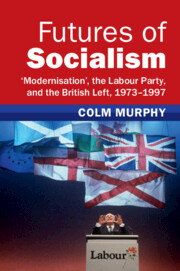‘Futures of Socialism makes a major contribution to our understanding of the British Left between the rise of Thatcherism and the emergence of New Labour. The book is a deft and nuanced exploration of Labour's late twentieth-century modernisation. It will undoubtedly become a touchstone in the history of the contemporary Left.’
Stephen J. Brooke - York University, Canada
‘Colm Murphy’s work brilliantly captures how the Left experienced a process of creative reinvention in the cold climate of the 1980s, challenging the myth of neo-liberal dominance in late twentieth century Britain. All observers of contemporary British history and politics should read this hugely important book.’
Patrick Diamond - Queen Mary University of London
‘In this engaging and nuanced book, Colm Murphy shows how a rich and varied discourse on the nature of ‘modernising’ Labour politics came to be narrowed into a single view of what that entailed. This is a powerful reminder of how the ‘roads not taken’ continue to shape the political present.’
Emily Robinson - University of Sussex
'A fascinating new history of New Labour’s early years … In addition to being a great piece of archival work, it has some interesting things to think about for all of us in the UK today.'
Stephen Bush
Source: Financial Times
‘Colm Murphy tells an important story more completely than anyone has done before: how Labour, step by painful step, shed its constitutional commitment to the abolition of capitalism and redefined its basic doctrine … his book is likely to remain for some time the fullest account of what happened during those years.’
Peter Kellner
Source: Inside Story
‘Futures of Socialism not only changes our understanding of modernisation, but Labour history itself.’
Ciaran McGurdy
Source: The Social Review
‘… this book offers a new look at the ideological change of the Labour Party and the British Left in the late 20th century … Recommended.’
M. K. Thompson
Source: Choice
‘There is no better starting point for politicians, commentators and academics who want to contribute to the debate on Labour’s past and future than Colm Murphy’s book … The great achievement of Murphy’s book is to have laid the foundation stone of the historiography of New Labour.’
Ben Jackson
Source: Renewal
‘… anyone interested in the remaking of socialism in the neoliberal age, in Britain and elsewhere, will benefit enormously from reading this erudite and well-written account of how the Labour Party was ‘modernized’ but not ‘neoliberalized’ during the 1980s and 1990s.’
Stefan Berger
Source: H-Soz-Kult
‘… a powerful example of the role historians can play as debunkers of inherited, politically motivated mythologies from our recent past; as narrators of complexity; and as arch-pluralists, urging us to understand political actors and thinkers on their own terms.’
Nick Garland
Source: Journal of British Studies



